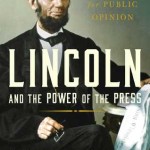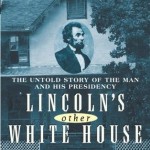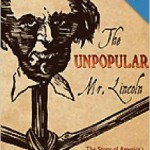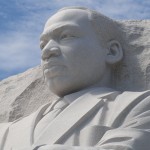 No one would mistake Abraham Lincoln for an artist, though scholars give him high marks on his writing. Long before there were speechwriters, politicians wrote their own material, and Lincoln is well known for such memorable speeches as the Gettysburg and Second Inaugural Addresses. He was also a great letter writer, often crafting policy positions in the form of “private” letters that were, in fact, intended for public consumption. His response to New York Tribune editor Horace Greeley, for example, in which he states his position on emancipation of the slaves, thus preparing the public for the proclamation that he had already prepared but not yet revealed, is a classic of historical writing.
No one would mistake Abraham Lincoln for an artist, though scholars give him high marks on his writing. Long before there were speechwriters, politicians wrote their own material, and Lincoln is well known for such memorable speeches as the Gettysburg and Second Inaugural Addresses. He was also a great letter writer, often crafting policy positions in the form of “private” letters that were, in fact, intended for public consumption. His response to New York Tribune editor Horace Greeley, for example, in which he states his position on emancipation of the slaves, thus preparing the public for the proclamation that he had already prepared but not yet revealed, is a classic of historical writing.
But did you know that our 16th President wrote poetry? Perhaps not on par with Robert Burns (one of his favorite poets), but clever and with great storytelling. Which reminds us that Lincoln is well known for his ability to tell a humorous story.
Nikola Tesla was also fond of poetry. He could recite long classic poems in their entirety, and could do so in several different languages. Tesla’s own writings were perhaps not as succinctly to the point as Lincoln’s but they were often entertaining and fanciful; not an easy task for an electrical engineer writing about cutting edge technical discoveries. Most of our knowledge of his childhood and early adult years come from Tesla’s own autobiographical accounts serialized in the scientific magazines of the day.
Tesla also was a big fan of the writings of Samuel Langhorne Clemens, better known as Mark Twain. Which gets us to yet another connection between Abraham Lincoln and Nikola Tesla.
Mark Twain in the House
Samuel Clemens, known to most of us by his pseudonym Mark Twain, was born in Hannibal, Missouri on November 30, 1835, shortly after Halley’s Comet had made its regular but rare pass by the Earth. The 26-year-old Abraham Lincoln – an amateur astronomy buff who two years earlier had marveled at the Leonid meteor showers – may very well have been gazing at the skies when Mark Twain came into this world. At that age Lincoln lived in New Salem, Illinois, just a stone’s throw across the Mississippi River from Hannibal. In 1859, Lincoln rode the Hannibal and St. Joseph Railroad to give a speech in Council Bluffs, Iowa. The railroad just happened to be formed in the office of Mark Twain’s father thirteen years before.
Lincoln floated flatboats down the Mississippi River to New Orleans as a young adult, then took steamboats back upriver. He often piloted steamboats around shoals near his New Salem home. Mark Twain had worked on steamboats on the river for much of his younger years, first as a deckhand and then as a pilot. Being a riverboat pilot gave him his pen name; “mark twain” is “the leadsman’s cry for a measured river depth of two fathoms (12 feet), which was safe water for a steamboat.” In 1883 Twain even titled his memoir, Life on the Mississippi. Lincoln’s time traveling on and piloting steamboats eventually inspired his patent for lifting boats over shoals and obstructions on the river.
Lincoln would not have read any of Mark Twain’s stories (his first, The Celebrated Jumping Frog of Calaveras County, was published in 1865, about seven months after Lincoln had been assassinated). But Twain says his humorous writing style was strongly influenced by another pen named-humorist, Artemus Ward, and the Jumping Frog story was published in the New York Saturday Press only because he finished it too late to be included in a book Artemus Ward was compiling. This is the same Artemus Ward that was so often read by Abraham Lincoln to break the tensions of the Civil War.
In fact, Lincoln was so entranced by the humor of Ward that on September 22, 1862 he read snippets from one of Ward’s books to his cabinet secretaries before settling into the business of the day – the first reading of the preliminary Emancipation Proclamation.
Ironically, Mark Twain’s piloting job ended when the Civil War started, as much of the Mississippi River became part of the war zone. So what is a writer/river-boatman to do? Well, join the Confederate army of course. His unpaid service lasted only two weeks in 1861 before disbanding. He then left for Nevada to work for his older brother, out of harm’s way for the rest of the war, though his brief service for the confederacy did give him material for another of his humorous sketches, The Private History of a Campaign That Failed.” Later, Mark Twain would publish the memoirs of Civil War hero and President, Ulysses S. Grant.
Like Lincoln, Mark Twain was very interested in science and technology. Twain actually had three patents of his own, for a type of alternative to suspenders, a history trivia game, and a self-pasting scrapbook. Many years after the Civil War he met and became close friends with Nikola Tesla. Often when he was in New York City Twain would hang out in Tesla’s laboratory. One photo taken only with the light produced by Tesla’s wireless lighting technology shows Mark Twain holding a ball of light.

They became such good friends that Tesla felt comfortable playing a practical joke on him. One day Mark Twain dropped by the lab and Tesla decided to have a little fun. He asked Twain to step onto a small platform and then set the thing vibrating with his oscillator. Twain was thrilled by the gentle sensations running through his body.
“This gives you vigor and vitality,” he exclaimed.
After a short time Tesla warned Twain that he better come down now or risk the consequences.
“Not by a jugfull,” insisted Twain, “I am enjoying myself.”
Continuing to extol on the wonderful feeling for several more minutes Twain suddenly stopped talking. Looking pleadingly at Tesla he yelled:
“Quick, Tesla! Where is it?”
“Right over there,” Tesla responded calmly. Off Twain rushed to the restroom, embarrassed by his suddenly urgent condition. Tesla smiled; the laxative effect of the vibrating platform was well known to the chuckling laboratory staff.
By the way, Mark Twain was also friends with Thomas Edison. And Edison filmed the only footage of Mark Twain currently in existence. The less-than-two-minute-long film would not win any Academy Awards for content or production value – its grainy images show Twain merely walking while smoking his cigar and eating lunch with his two daughters – but it has obvious cultural and historical significance. Mark Twain died the following year, the day after Halley’s Comet returned for the first time since Twain’s birth, in effect, seeing him both into this world and out of it.
[The above is adapted from my e-book, Abraham Lincoln and Nikola Tesla: Connected by Fate, available for download on Amazon.com.]
Click here for more posts here on Science Traveler about the connections between Lincoln and Tesla.
David J. Kent is the author of Lincoln: The Man Who Saved America, now available. His previous books include Tesla: The Wizard of Electricity and Edison: The Inventor of the Modern World (both Fall River Press). He has also written two e-books: Nikola Tesla: Renewable Energy Ahead of Its Time and Abraham Lincoln and Nikola Tesla: Connected by Fate.
Check out my Goodreads author page. While you’re at it, “Like” my Facebook author page for more updates!
Follow me by subscribing by email on the home page. Share with your friends using the buttons below.






 Martin Luther King Jr. had a dream. A dream in which “
Martin Luther King Jr. had a dream. A dream in which “







 Harold Holzer shows why he is considered the leading Abraham Lincoln expert as he adds to his tremendous legacy of scholarship. The focus of this latest book is Lincoln’s relationship with the press. It’s important to know that the newspapers of the day were highly partisan and often closely aligned with a particular party or candidate. They were also fiercely antagonistic to each other and to the opposing party. If a politician didn’t have a good relationship with the press, they had no compunction to viciously and directly attacking him, and in many cases, making things up.
Harold Holzer shows why he is considered the leading Abraham Lincoln expert as he adds to his tremendous legacy of scholarship. The focus of this latest book is Lincoln’s relationship with the press. It’s important to know that the newspapers of the day were highly partisan and often closely aligned with a particular party or candidate. They were also fiercely antagonistic to each other and to the opposing party. If a politician didn’t have a good relationship with the press, they had no compunction to viciously and directly attacking him, and in many cases, making things up. Abraham Lincoln lived in the White House from March 1861 until his assassination in April 1865. Or did he? In fact, he spent most of the summer months of 1862 through 1864 – about a quarter of his presidency – living in the Soldier’s Home. Author Elizabeth Smith Brownstein gives us a fascinating, as well as delightful, look at Lincoln’s Other White House.
Abraham Lincoln lived in the White House from March 1861 until his assassination in April 1865. Or did he? In fact, he spent most of the summer months of 1862 through 1864 – about a quarter of his presidency – living in the Soldier’s Home. Author Elizabeth Smith Brownstein gives us a fascinating, as well as delightful, look at Lincoln’s Other White House. This book, The Unpopular Mr. Lincoln: The Story of America’s Most Reviled President, is a rather extraordinary look at Abraham Lincoln. And a remarkably pleasant surprise given the uncustomary view of Lincoln, as well as the providence of the author. Larry Tagg is not whom you might expect to be writing a biography of Abraham Lincoln. Some will recognize the name from the music world and Tagg’s band Bourgeois Tagg, or from his many years touring with Todd Rundgren, Hall & Oates, and opening for Robert Palmer, Belinda Carlisle and others. Now a high school English and drama teacher in California, Tagg surprises the reader with his deep understanding of Lincoln and his times. And he tackles an often overlooked and difficult facet of how Lincoln was viewed by contemporaries.
This book, The Unpopular Mr. Lincoln: The Story of America’s Most Reviled President, is a rather extraordinary look at Abraham Lincoln. And a remarkably pleasant surprise given the uncustomary view of Lincoln, as well as the providence of the author. Larry Tagg is not whom you might expect to be writing a biography of Abraham Lincoln. Some will recognize the name from the music world and Tagg’s band Bourgeois Tagg, or from his many years touring with Todd Rundgren, Hall & Oates, and opening for Robert Palmer, Belinda Carlisle and others. Now a high school English and drama teacher in California, Tagg surprises the reader with his deep understanding of Lincoln and his times. And he tackles an often overlooked and difficult facet of how Lincoln was viewed by contemporaries. Barack Obama has said that the two people he admires most are Martin Luther King and Abraham Lincoln. Perhaps this shouldn’t be much of a surprise. In Dreams From My Father, Obama recounts his trials growing up as a young black man with mixed race heritage. While clearly a different upbringing than that of most black men living in America, he did experience the prejudices that were openly prevalent then, and more subtle and covert today.
Barack Obama has said that the two people he admires most are Martin Luther King and Abraham Lincoln. Perhaps this shouldn’t be much of a surprise. In Dreams From My Father, Obama recounts his trials growing up as a young black man with mixed race heritage. While clearly a different upbringing than that of most black men living in America, he did experience the prejudices that were openly prevalent then, and more subtle and covert today. Obama did not mention Lincoln by name during his
Obama did not mention Lincoln by name during his 
 This is Part Two of a series about inauguration speeches, in particular that of Abraham Lincoln, whose bible was used by President Barack Obama for both his first and second inaugurations. It is best to
This is Part Two of a series about inauguration speeches, in particular that of Abraham Lincoln, whose bible was used by President Barack Obama for both his first and second inaugurations. It is best to 






